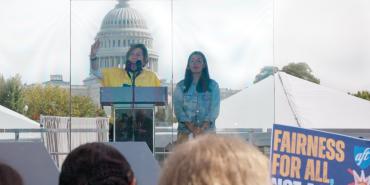We, the people, say: ‘No Kings’
Democracy and economic opportunity are inextricably linked.
Just days after 7 million people took to the streets across the United States to declare that America has no kings, President Donald Trump—without asking for or getting permission—ordered a wing of the White House to be demolished in order to construct a massive ballroom. I taught social studies, not English, but with the spectacle of bulldozers knocking down part of the People’s House to build a palatial party space—while the government is shut down and millions of Americans risk losing healthcare and food assistance—well, the symbolism is hard to miss.
It illuminates twin crises gripping the country: grave threats to democracy, and millions of Americans’ struggle to afford basic necessities. Both crises have motivated people to rise up, making the Oct. 18 “No Kings” events the largest day of protest in American history.
Trump, House Speaker Mike Johnson and other Republican leaders characterized the protests as “Hate America” rallies that would attract violent, anti-American terrorists. Whether their intent was to control the narrative, suppress turnout or stoke fear, they failed. The protest leaders were committed to nonviolence, and the 2,700 events were peaceful across the board. The scenes from that day—of senior citizens waving American flags; children holding homemade signs; dogs adorned in red, white and blue; and lots of inflatables—were wholesome, joyful and patriotic. “No Kings” was about fighting for America.
Our history is clear. America’s founding fathers drafted the Declaration of Independence and the Constitution to affirm the rule of law and to prevent the rule of one, so that the United States would never again have a king. Abraham Lincoln expressed his hope in the Gettysburg address that “government of the people, by the people, for the people shall not perish from the earth.” Franklin D. Roosevelt’s “Economic Bill of Rights” included adequate healthcare, housing, education and living wages.
Some call these values radical. What is radical about them? Aren’t they what we and every leader we elect should want? Why would it be “conservative” or “liberal” to have a voice in democracy, strong public schools and fair wages? Or to want affordable groceries, housing, healthcare, transportation, child care or higher education? Aspiring for a better life for all should not have a party label.
We are far from achieving these aspirations. American democracy is backsliding, from presidential overreach to threatening free and fair elections. The top 10 percent of earners account for half of all consumer spending, while millions of Americans are struggling to get by. An AP-NORC poll found that 78 percent of adults say at least one necessity—housing, savings, groceries, healthcare, utilities, taxes or income—is a major cause of stress. GoFundMe users increasingly are seeking help to cover essential needs, such as groceries.
We have a crisis of downward mobility. Men with a high school degree earn 22 percent less than they did 45 years ago. This is an economic and psychic blow for a country that long believed each generation would do better than the last.
Trump promised to make life better and more affordable, but his policies have cast our economy and government into chaos. And now the shutdown of the federal government is causing even more pain. Roughly 42 million people could lose critical food assistance when Supplemental Nutrition Assistance Program funding runs out in November. Millions of Americans are already seeing their health insurance costs skyrocket for 2026 as Republicans refuse to negotiate extending premium subsidies. The average Affordable Care Act marketplace consumer will pay $1,904 in annual premiums next year, up from $888 in 2025, according to the health policy group KFF.
A recent Harvard Youth Poll found that more than 4 in 10 Americans under 30 are “barely getting by” financially, facing difficult job prospects and often saddled with crushing student debt. The AFT won a significant legal victory last week, in which the Trump administration agreed to provide student debt relief, including canceling student debt for all eligible borrowers enrolled in income-based repayment.
Democracy and economic opportunity are inextricably linked. Without a strong democracy, only the rich and powerful, and those in the leader’s favor, have agency and opportunity. That is an undeniable part of the appeal of Zohran Mamdani’s mayoral campaign. No doubt it will play a role in the gubernatorial elections in New Jersey and Virginia. And it motivated many who participated in the “No Kings” protests.
Americans want leaders who will expand access to healthcare, lower the cost of groceries and housing, strengthen public schools, make college affordable and embrace workers’ rights. We want the president to focus on solving our problems, not building gilded edifices or punishing his political opponents. We want a society based on the rule of law, not chaos, corruption and cruelty. We, the people, must act to secure the kind of society and government we want.

